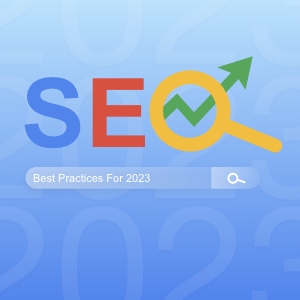SEO Best Practices for 2023


In the ever-changing world of digital marketing, search engine optimization (SEO) remains a cornerstone for driving organic traffic and enhancing online visibility. As we navigate our way through 2023, the SEO landscape continues to evolve, presenting new challenges and opportunities for businesses to excel. In this blog post, we’ll delve into the latest SEO best practices that will help you stay ahead of the curve and achieve impressive results in the coming year.
1. User Experience takes centre stage:
In 2023, search engines are placing a strong emphasis on user experience as a crucial ranking factor. Websites that offer seamless navigation, fast loading times, mobile responsiveness, and clear information architecture are more likely to secure higher search engine rankings. Invest in optimizing your site’s speed, mobile-friendliness, and overall user interface to provide a satisfying browsing experience for your visitors.
2. Quality content continues to reign supreme:
High-quality, relevant, and informative content remains at the heart of successful SEO strategies. Search engines are becoming increasingly proficient at identifying content that truly adds value to users. Focus on creating in-depth, authoritative, and engaging content that answers users’ questions and addresses their needs. Long-form content, multimedia elements, and well-structured articles can help establish your website as an authoritative source in your industry.
3. E-A-T and Expertise matters:
Expertise, Authoritativeness, and Trustworthiness (E-A-T) continue to play a crucial role in SEO. Google’s algorithms assess the credibility of websites and their authors to ensure that users receive accurate and reliable information. Establish your expertise by showcasing author credentials, leveraging authoritative sources, and demonstrating a commitment to accuracy and transparency.
4. Core Web Vitals:
Google’s Core Web Vitals have gained prominence as key ranking factors. These metrics measure various aspects of user experience, including page loading speed, interactivity, and visual stability. Websites that meet or exceed Core Web Vitals standards are likely to receive a ranking boost. Regularly monitor and optimize these metrics to enhance user satisfaction and SEO performance.
5. Schema Markup and Rich Snippets:
Enhance your website’s visibility in search results by leveraging schema markup and rich snippets. These structured data formats provide search engines with additional context about your content, enabling them to display more informative and visually appealing search results. Rich snippets can lead to higher click-through rates and improved organic traffic.
6. Voice Search Optimization:
As voice search continues to gain popularity, optimising for voice-based queries is becoming essential. Focus on conversational, long-tail keywords and phrases that mirror natural language. Consider creating FAQ-style content to address common voice search queries and provide concise, informative answers.
7. Secure and Accessible Websites:
Website security (HTTPS) and accessibility are not only important for user experience but also impact search rankings. Secure websites instil trust in users, while accessible websites ensure that all visitors, including those with disabilities, can navigate and interact with your content effectively.
8. Local SEO and Google My Business:
For businesses with a physical presence, local SEO remains a vital component. Optimize your Google My Business listing with accurate business information, customer reviews, and compelling visuals. Local citations and consistent NAP (Name, Address, Phone number) data across the web contribute to improved local search visibility.
9. Mobile-First Indexing:
Mobile-first indexing means that Google predominantly uses the mobile version of your website for indexing and ranking. Ensure that your website is fully responsive and provides a seamless experience across all device types. Mobile optimization is no longer an option—it’s a necessity.
10. Data-Driven Analysis and Adaptation:
Stay agile in your SEO strategy by consistently analyzing performance data. Monitor keyword rankings, organic traffic, user behaviour, and conversion metrics. Use these insights to adapt your approach, refine your content, and make informed decisions to improve your SEO efforts.
In Conclusion:
We have been employing these SEO best practices at Verve throughout 2023 and they have proved fruitful for all our clients. We are not shy about sharing what we do with our clients and are very open, as we recognise that in order for SEO to be done well time needs to be devoted to it. Time is often in short supply for our clients!
By prioritising user experience, creating exceptional content, demonstrating expertise, and staying updated with the latest algorithmic changes, we have been well-equipped to navigate the dynamic world of SEO and achieve sustainable organic growth. Remember, if doing it yourselves, the key to effective SEO is a holistic approach that combines technical expertise, creativity, and a genuine commitment to meeting user needs.
Please contact our digital marketing team if you have questions regarding the optimisation of your website!
